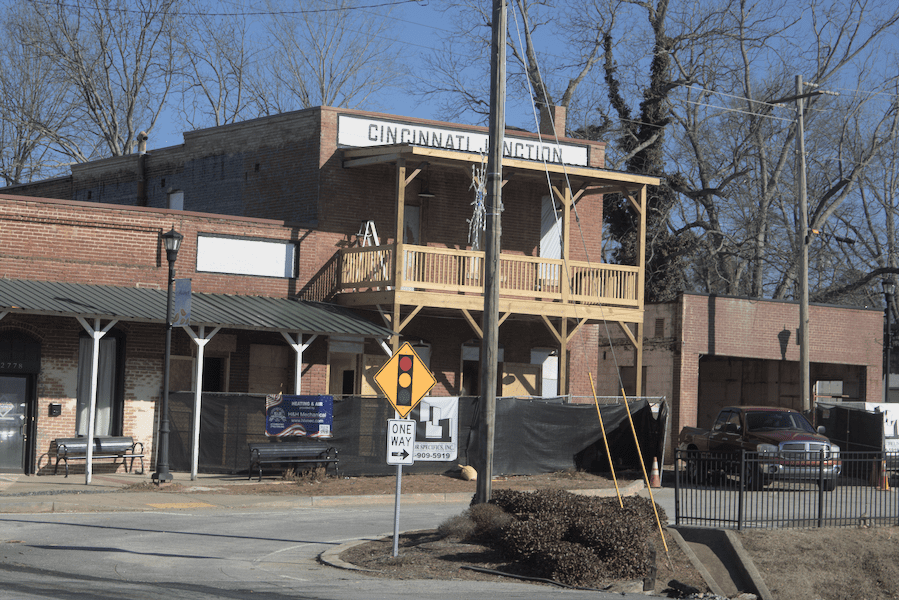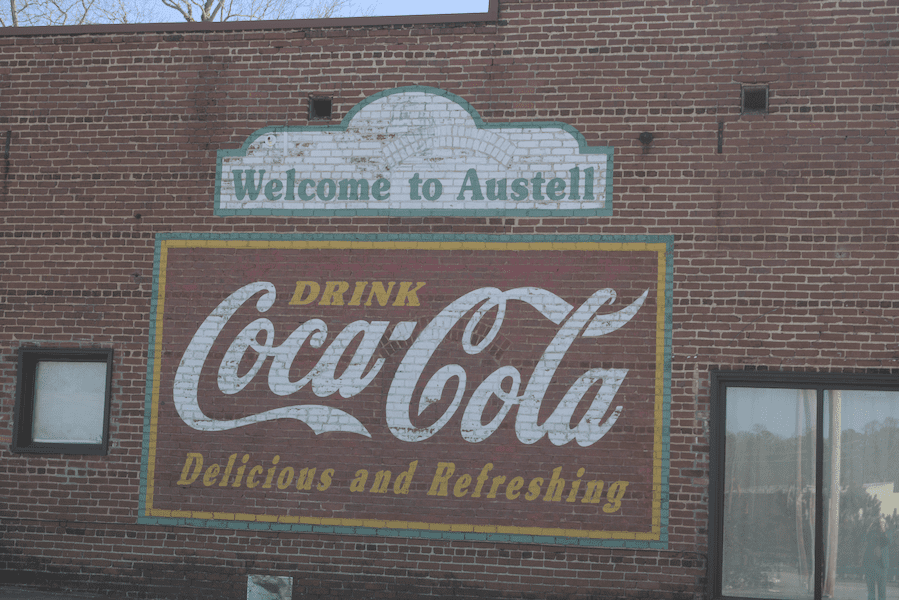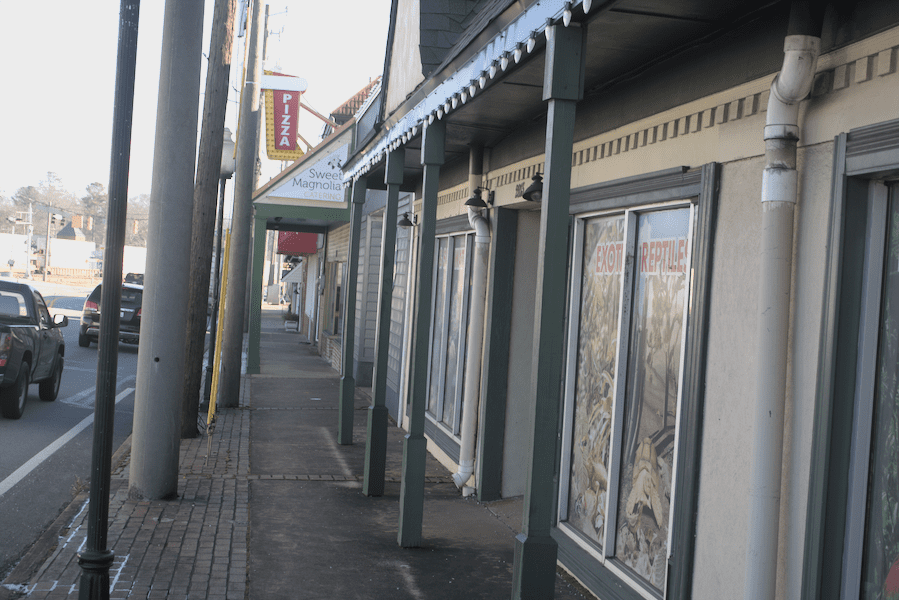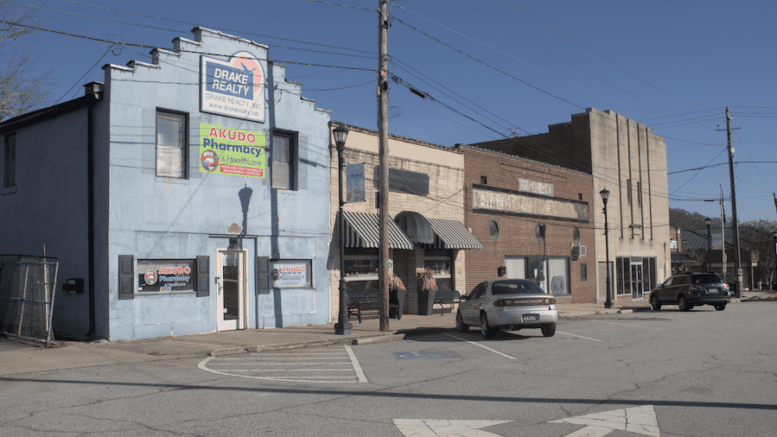The Courier spoke via Zoom with the organizers of Create Austell, a new group focused on bringing walkability, livability, and environmental sustainability to downtown Austell.
Create Austell is holding a public launch meeting next Saturday, January 14, 2023 at Cowork, 2760 Broad St, Austell, GA 30106. You can RSVP by visiting this link.
The Zoom call included Derek Caffe, Natasha Dyer, Daniel Lamb and Matt Stigall.
Caffe emphasized implementing a “road diet” to make the Veterans Memorial Highway less oriented toward cars and more toward pedestrians, while Dyer advocated for environmentally-conscious policies and practices that reduce landfills and climate-changing emissions. Lamb talked about making Austell a center of community art, and Stigall laid out some options for public transit.

Caffe, an Austell real estate broker said, “When I tell people about downtown Austell, one of the first things they respond with is ‘Austell has a downtown?’.”
“Most people don’t even realize that there is a downtown Austell,” he said. “And there are people who lived in Austell back in the early 2000s, and they are like, ‘I don’t remember anything about a downtown or anything of that nature.'”
“So what we’re looking for is to push that downtown because a lot of us actually live in the downtown area,” he said. “And although we’ve moved here, we saw potential, it wasn’t exactly where we want it.”

Caffe said that in talking to his neighbors, he felt there needed to be a lightning rod to join all the parts of the community that his neighbors wanted to improve.
He said he ran into Matt Stigall, a local public transit advocate, at a meeting about the scoping study for a trail to connect downtown Austell to the Silver Comet Trail in Powder Springs.
“And then we got together over lunch and talked about things,” Caffe said. “And then from there, it just started snowballing.”
“And so we looked for different members so we can have a unified voice to have the downtown that we’ve always desired,” he said. “But up until this point, we had no clue exactly how to make it happen and how to get people together around this.”
“That’s what Create Austell is about.”
Caffe said that one of the goals in creating a walkable community should be to increase residential density downtown so that more local businesses in the downtown area can be supported.
He said that in real estate, a slogan is “retail follows rooftops,” so if the density increases, more businesses will be willing to commit to downtown Austell.
“The built environment has a huge impact on how we use it,” Caffe said. “I know that a lot of times as me and my wife travel to different parts of the world, our behaviors change based on the way the environment is built.”
“If you’re in an old world European city, it’s not going to be designed around the car,” he said. “It’s going to be designed around moving people around. So when people go to European countries they find out that they walk more.”
“Or I’ve been to parts of Mexico, where we will spend the entire day walking, visiting shops, partaking in attractions.”
He said when he returns to his home in downtown Austell, with the tiny sidewalks along Veterans Memorial Highway, and cars whizzing by inches away, “It’s not an environment that creates the desire for people to want to walk in our downtown …”

Natasha Dyer said that as Austell grows and attracts more people the city should look at ways to reduce emissions and avoid sending stuff to landfills.
“And I think that there’s just something the city should be looking at: trying to figure out its emissions, especially as it’s growing and expanding, and how we can reduce some of that, whether that’s looking at how we energize our buildings, or whether or how we even handle our waste in the city and county,” she said. “So that’s why I’m involved. When I listened to all of the members in the group we’re all talking about people, planet, profit. And it’s all kind of tied together under sustainability for me.”
“I think we do need to kind of energize more of a younger voice these days …” she said. “So I’m completely energized, and hope that we will draw more younger voices to actually create a community, a city, a county, a country where they’re going to live and take on the next mantle.”
“So of course, those those older voices are important,” Dyer said. “But we need to figure out a way to get more people that are this kind of age that’s going to be living here for a while to be a part of the development and the design of what their city looks like.”
The Courier asked Dyer about what sort of policies she’d propose to help the environment.
“I’d have to go into the weeds, but I think what we should do is kind of move towards a pay as you throw system,” she said. “Decatur has the system going just fine. And other areas around the country where … you’re charged by the bag.”
“You’re charged by the bag instead of being charged by your cart because basically I’m someone who puts out my cart every two months, right? Because I’m doing the right thing by recycling, I’m composting, but yet my waste rates are going up every year.”
“And so how to incentivize people to actually divert things from a landfill is that you make it to where waste is more expensive, and recycling and other alternatives like composting are more affordable,” she said.
“And why food waste is especially important to try to figure out how to get out of the landfill is because we’re actually past the point of needing to stop putting carbon up in the atmosphere or greenhouse gases up the atmosphere,” she said.
She said that whether the resulting compost is used for gardening, or just to build topsoil, it keeps carbon in the soil, and out of the atmosphere, and reduces climate change.
The Courier asked Dyer whether she thought the responsibility for recycling and composting should be on the individual or whether it’s a collective responsibility.
“I think group or collective solutions are best, because a lot of the time when you think of recycling and getting things out of the landfill, the onus is put on the consumer,” she said. “And I don’t think that’s good enough. It should be put on the manufacturer who should want that product back because, basically, we have to design out waste, it shouldn’t be put on the homeowner.”
“We should be starving landfills because eventually we’re going to be so low on resources that there will actually be companies who are going to be mining landfills at some point, because we’re going to run out of copper in like 20 years, right?” she said. “We’re going to run out. We’re on a finite planet, and eventually we’re going to run out of some stuff. And we’re going to start mining landfills.”
She said that a goal should be an end to landfills, and toward a situation where everything that is manufactured, including material from the demolition of buildings, gets reused.

Daniel Lamb said he’d like more community art and cultural events in Austell.
“There are so many robust, great things happening in Atlanta neighborhoods that could become a part of the neighborhood culture out here as we start to gain neighborhood identities,” he said. “Things like Chomp and Stomp or the Porchfest, or things like neighborhood-supported performances, house tours, murals, working with local schools to get more kids access to things like art classes, and music classes and enrichment activities, outside of what’s already there.”
He said a lot of what is already in Austell is tucked away in silos, and needs to be promoted in the community so it’s more widely known.
“I lived and worked in the Poncey-Highland area for about six years,” he said. “And I loved the culture around it; bartending there and going out on the weekends to things like the Inman Park Festival, or the Little Five Points Halloween parade, all these little things that when you add them up together, it becomes a really great lifestyle and culture.”
The Courier asked about the prospects for public transit in Austell, and Matt Stigall, a transit advocate and member of the Cobb Transit Advisory Board spoke.
“Austell presents itself very well for bus or rail, or both if it’s possible,” Stigall said. “You’ve already got an existing train going through it. So it would be great if there was a regional rail network.”
“But if that’s not possible, you do have Veterans Memorial that would be set up perfectly for a bus route that goes straight into the city,” he said.
“But then you also have Thornton Road, that would give you a nice north and south, take you straight to I-20. And then you go eastbound from there into the city, or the Six Flags area and the Hamilton Holmes Marta station,” he said. “
“So there’s great opportunity there for bus routes to basically connect you to the rest of the region,” Stigall said.
“Also, I think the future, when we talk about mobility, comes with microtransit,” he said. “So you could have a shuttle. Once downtown becomes more attractive with more bars and restaurants and shops, you’d have a shuttle that literally goes and picks up people from their house or from near their home, and brings them right into downtown.”
“You’d a see much more welcoming (downtown) and much more attractive for people to go there and hang out and spend their money and be a part of their community,” he said.
The Courier asked if there was anything left out of the conversation that anyone in Create Austell zoom call would like to mention.
Caffe answered.
“We have our launch on January 14, from 4 p.m to 6:30 p.m. at Austell Cowork, we want anybody who’s interested in improving Austell and creating a better Austell to be there, and to become part of this energy of a group of people who want to see Austell be a better place.”
“And so we’re just hoping that anybody who’s interested, or thinking they’re interested just to come out and see some of the things that we have going on,” he said. “Because we plan to have a monthly gathering so we can continue to build friendships, and socialize around the progress of Austell.”
For more information about Create Austell, visit their Facebook group.
————————————————————————————————————-
